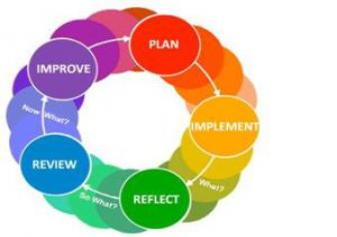Learning and adaptive management are critical elements in a cycle of continuous improvement, which is needed to provide water and sanitation services in an ever-changing environment.
Published on: 18/12/2012
At present, systematic documentation and learning in the Water, Sanitation and Hygiene (WASH) sectors often depends on external project-related funding. Two challenges are: how to institutionalize learning as an integrated component of good WASH sector management and how to link sector monitoring to continuous reflection and evidence-based action.
There are two broad learning processes which can contribute to accountability and greater effectiveness of work on WASH (and in other sectors too):
(1) Learning from research, monitoring data and independent evaluation
(2) Learning from practice and feedback from peers
Formal sector review mechanisms such as Joint Sector Reviews, sector- wide monitoring, or systematic consultations with stakeholder groups exist in many countries, but efforts are needed to strengthen and link such initiatives, so that learning becomes an integral part of sector monitoring, implementation and planning processes, in particular at sub-national levels (region, district, sub-district and consumer levels).
The monitoring and learning process cycle
 Monitoring and learning cycle (IRC/Triple S).
Monitoring and learning cycle (IRC/Triple S).Learning and adaptive management can be seen as two sides of the same coin. Or as elements of a cycle of continuous improvement, where monitoring can help identify patterns, trends problems and things that work. The key aspects of adaptive management are
A ‘learning sector’ can continuously innovate, evolve and adapt
Monitoring is not a stand-alone activity, but a deliberate process to capture and use information to track emerging patterns or trends and inform action.
"Building a learning sector with the capacity to continuously innovate, evolve and adapt based on evidence is a must for delivering sustainable services and requires the capacity and willingness to do things together, better and differently.” (waterservicesthatlast, 2012).
To create a 'learning sector’ where sector professionals are able to adapt to changing circumstances and demands, we need mechanisms to:
A 'learning sector' has processes and mechanisms that help sector players actively create, capture, transfer, and mobilize knowledge to enable the sector as a whole to adapt to change. Management systems to make organisations more accountable to their promises need to be joined up with systems that encourage sector professionals to critically reflect on problems and solutions and to recognise emerging trends. But, systems and procedures, formats and workshops are not enough, it will also take leadership and personal commitment to create a culture of continuous learning.
IRC supports learning processes in various countries, while also advocating for learning and adaptive management to be recognized as central to sector performance. Resource centres and learning alliances are two ways that IRC has been supporting learning and change in water and sanitation. In Ghana and Uganda, IRC's Triple-S programme has also been advocating for sector learning and supporting learning processes to improve the sustainability of rural water services. At international level we work with the Sanitation and Water for All and others to promote learning for sustainable WASH.
IRC's pamphlet on sector learning entitled 'WASH sector learning : continuous improvement for services that last' contains more information on learning for improvement in the WASH sector (scroll down to access the pamphlet).
At IRC we have strong opinions and we value honest and frank discussion, so you won't be surprised to hear that not all the opinions on this site represent our official policy.